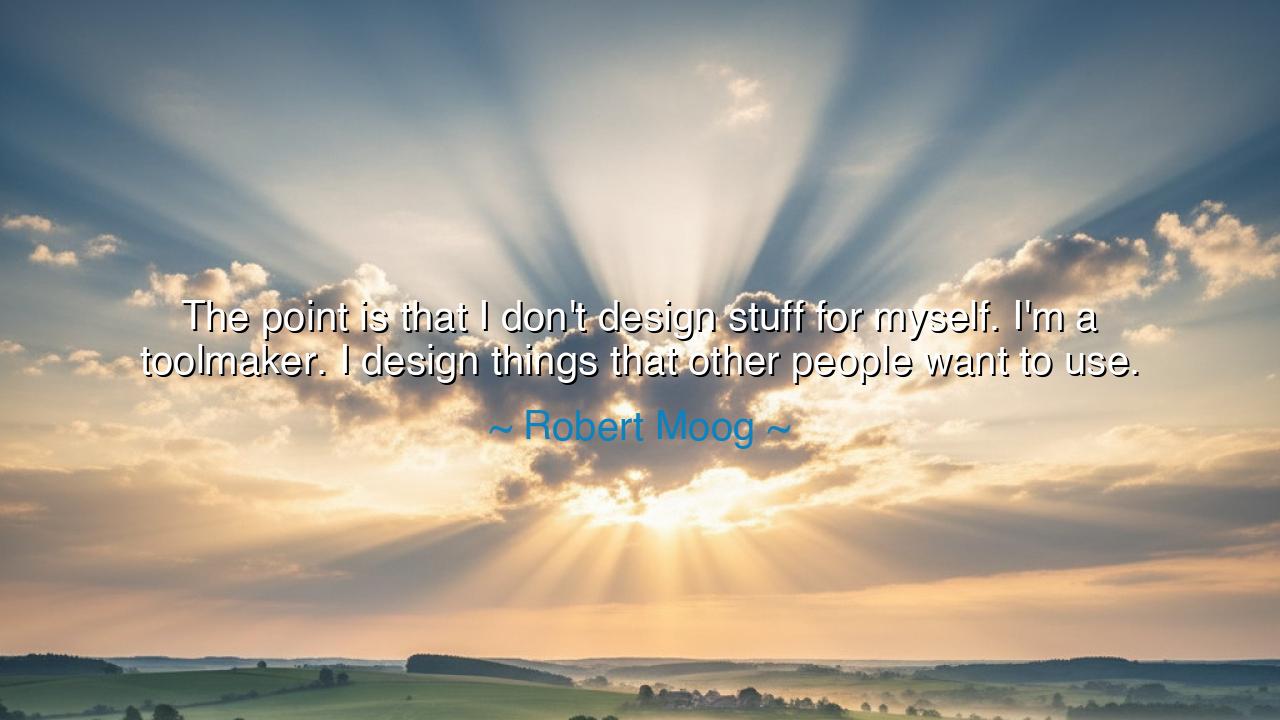
The point is that I don't design stuff for myself. I'm a
The point is that I don't design stuff for myself. I'm a toolmaker. I design things that other people want to use.






“The point is that I don’t design stuff for myself. I’m a toolmaker. I design things that other people want to use.” — Robert Moog
Thus spoke Robert Moog, the quiet genius who gave the world a new voice — the voice of the synthesizer, an instrument that reshaped the soundscape of the modern age. His words are simple, yet they bear the humility and wisdom of a true craftsman. In them lies a timeless truth: that the highest purpose of creation is service, and the truest measure of genius is not self-expression, but empowerment. Moog saw himself not as a performer upon the stage, but as a toolmaker, shaping the instruments through which others might bring forth their art, their emotion, their truth.
In calling himself a toolmaker, Moog stands among the great inventors and artisans of history — those who built not for glory, but for utility and beauty. He did not design for himself; he designed for the dreamers, the musicians, the seekers of sound who had longed for ways to shape music beyond the limits of strings and reeds. When he first crafted his modular synthesizer in the 1960s, it was not for fame, but for function — a humble machine of circuits and voltage that, in the right hands, could summon the voices of the cosmos. From that instrument came new worlds of sound — the ethereal tones of Wendy Carlos, the pulsing rhythms of Kraftwerk, the soaring dreams of countless artists who found in his invention the freedom to create anew.
Moog’s insight speaks to a greater moral principle: that innovation without empathy is hollow. To make something merely to please oneself is to create an echo; to make something that serves others is to create a song that outlives its maker. The toolmaker sees beyond his own needs — he sees the hands that will one day grasp his creation, the hearts that will be moved by its power. He builds not idols, but bridges — between imagination and reality, between the individual and the collective, between the artist and the world.
Consider the story of Leonardo da Vinci, who designed machines not only for his own wonder, but for the use of mankind. He dreamed of flying devices, irrigation systems, and instruments of study — not for the satisfaction of his curiosity alone, but because he saw the divine purpose in helping others reach further. So it was with Moog. His synthesizer was not a monument to himself; it was an invitation to others to create, to explore, to feel. It was a vessel of potential, a tool of liberation.
To be a toolmaker, then, is to embrace humility in creation. The artist may chase applause, but the toolmaker seeks something deeper — to enable, to inspire, to give power to the hands of others. In this way, Moog reminds us that the highest form of creativity is collaboration between the maker and the user, between invention and expression. Every tool is incomplete until it is touched by another’s imagination.
So, my children, take this lesson to heart: when you create, ask not “What do I want?” but “What might others need?” Whether you build machines, write songs, or shape ideas, let your work be a gift, not a monument. For the world is moved not by those who boast of their genius, but by those who quietly equip others to shine. A true creator leaves behind not just beauty, but possibility — tools that empower the next generation to dream greater dreams.
And remember this: Robert Moog never sought to stand in the spotlight, yet through his tools, countless others found their voice. The humblest craftsman, when guided by purpose, becomes a cornerstone of civilization. So live as Moog lived — build for others, not yourself. For in serving creation, you join the eternal lineage of the toolmakers — those who, through their craft, awaken the music that lies sleeping in the hearts of humankind.






AAdministratorAdministrator
Welcome, honored guests. Please leave a comment, we will respond soon